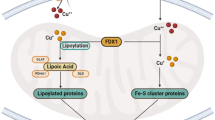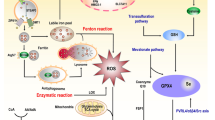Abstract
Background
Previous reports stated that DNA polymerase ζ is highly expressed in lung cancer tissues. The present study aimed to investigate the roles and underlying mechanism of DNA polymerase ζ in lung cancer cell radioresistance.
Methods
The A549 and HCC827 cells were used to evaluate the effects of different doses of radiation on the mRNA and protein expressions of DNA polymerase ζ. Multiple assays, including PCR, western blot, flow cytometry, and EdU have been used to investigate the roles of DNA polymerase ζ on the cellular behaviors of A549 and HCC827 cells.
Results
The mRNA and protein expression of REV7L in A549 and HCC827 cells were significantly increased after 6 Gy irradiation compared to the control group. In A549 and HCC827 cells, over-expression of polymerase ζ decreased the radiosensitivity, inhibited cell apoptosis as well as reduced oxidative stress; while the knockdown of polymerase ζ showed the opposite effects. Knockdown of Polymerase ζ in xenograft animal models significantly decreased tumor size and induced oxidative stress of tumor tissues after irradiation.
Discussion
Our results provided a theoretical basis for targeting DNA polymerase ζ to improve the radiosensitivity of the lung cancer cells to radiotherapy.




Similar content being viewed by others
Data availability
The datasets used and/or analyzed during the current study are available from the corresponding author on reasonable request.
References
Bradley CJ, Megan E, Perraillon MC (2019) Factors associated with use of high-cost agents for the treatment of metastatic non-small cell lung cancer. J Nat Cancer Instit 112(8):802–809
Takeda M, Sakai K, Hayashi H, Tanaka K, Haratani K, Takahama T et al (2020) Impact of coexisting gene mutations in EGFR-mutated non-small cell lung cancer before treatment on EGFR T790M mutation status after EGFR-TKIs. Lung Cancer 139:28–34
Martini K, Ottilinger T, Serrallach B, Markart S, Glaser-Gallion N, Blüthgen C et al (2019) Lung cancer screening with submillisievert chest CT: potential pitfalls of pulmonary findings in different readers with various experience levels. Eur J Radiol 121:108720–108720
Ward RA, Anderton MJ, Bethel P, Breed J, Cook C, Davies EJ et al (2019) Discovery of a potent and selective oral inhibitor of ERK1/2 (AZD0364) that is efficacious in both monotherapy and combination therapy in models of nonsmall cell lung cancer (NSCLC). J Med Chem 62:11004–11018
Sezer HF, Abdullayev G, Avci A, Ozbay S, Topcu S (2019) Segmentectomy for primer lung cancer, which arise from azygos lobe: azygos lobectomy. Tuberk Toraks 67:231–233
Ahmad TR, Doan T, Gonzales JA, Acharya NR, Tsui E (2020) Clinical course of preexisting uveitis during treatment of lung cancer with durvalumab. Ocul Immunol Inflamm 28:566–570
Liu C, Jing W, An N, Li A, Yan W, Zhu H et al (2019) Prognostic significance of peripheral CD8+CD28+ and CD8+CD28- T cells in advanced non-small cell lung cancer patients treated with chemo(radio)therapy. J Transl Med 17:344–344
Suwinski R, Giglok M, Galwas-Kliber K, Idasiak A, Jochymek B, Deja R et al (2019) Blood serum proteins as biomarkers for prediction of survival, locoregional control and distant metastasis rate in radiotherapy and radio-chemotherapy for non-small cell lung cancer. BMC Cancer 19:427
Yoon JH, Roy CJ, Prakash L, Prakash S (2019) Translesion synthesis DNA polymerases eta, iota, and nu promote mutagenic replication through the anticancer nucleoside cytarabine. J Biol Chem 294:19048–19054
Hrabina O, Brabec V, Novakova O (2019) Translesion DNA synthesis across lesions induced by oxidative products of pyrimidines: an insight into the mechanism by microscale thermophoresis. Int J Mol Sci 20:5012
Jin S, Hu Y, Fu H, Jiang S, Xiong Y, Qiao H et al (2019) Identification of potentially novel functions of DNA polymerase zeta catalytic subunit in oriental river prawn, Macrobrachium nipoponense: cloning, qPCR, in situ hybridization and RNAi analysis. 3 Biotech 9:1–10
Martin SK, Wood RD (2019) DNA polymerase zeta in DNA replication and repair. Nucleic Acids Res 47:8348–8361
Chen X, Zhu H, Ye W, Cui Y, Chen M (2019) MicroRNA29a enhances cisplatin sensitivity in nonsmall cell lung cancer through the regulation of REV3L. Mol Med Rep 19:831–840
Kong L, Murata MM, Digman MA (2018) Absence of REV3L promotes p53-regulated cancer cell metabolism in cisplatin-treated lung carcinoma cells. Biochem Biophys Res Commun 496:199–204
Ichijo H, Nishida E, Irie K, Dijke PT, Saitoh M, Moriguchi T et al (1997) Induction of apoptosis by ASK1, a mammalian MAPKKK that activates SAPK/JNK and p38 signaling pathways. Science (Am Assoc Adv Sci) 275:90–94
Moon D, Kim M, Choi YH, Hyun JW, Chang WY, Kim G (2009) Butein induces G2 /M phase arrest and apoptosis in human hepatoma cancer cells through ROS generation. Cancer Lett 288:204–213
Aggarwal V, Tuli HS, Varol A, Thakral F, Yerer MB, Sak K et al (2019) Role of reactive oxygen species in cancer progression: molecular mechanisms and recent advancements. Biomolecules (Basel, Switzerland) 9:735
Wang X, Pernicone N, Pertz L, Hua D, Zhang T, Listovsky T et al (2019) REV7 has a dynamic adaptor region to accommodate small GTPase RAN/ Shigella IpaB ligands, and its activity is regulated by the RanGTP/GDP switch. J Biol Chem 294:15733–15742
Gu C, Luo J, Lu X, Tang Y, Ma Y, Yun Y et al (2019) REV7 confers radioresistance of esophagus squamous cell carcinoma by recruiting PRDX2. Cancer Sci 110:962–972
Findlay S, Heath J, Luo VM, Malina A, Morin T, Coulombe Y et al (2018) SHLD2/FAM35A co-operates with REV7 to coordinate DNA double-strand break repair pathway choice. EMBO J 37:1
Liu J, Zhao X, Nie W, Yang Y, Wu C, Liu W et al (2021) Tumor cell-activated “sustainable ROS generator” with homogeneous intratumoral distribution property for improved anti-tumor therapy. Theranostics 11:379–396
Ma Q, Meng X, Wu K, Cao J, Yu R, Yan Z (2019) Sinularin exerts anti-tumor effects against human renal cancer cells relies on the generation of ROS. J Cancer 10:5114–5123
Kreuz S, Fischle W (2016) Oxidative stress signaling to chromatin in health and disease. Epigenomics 8:843–862
Wang J, Yi J (2008) Cancer cell killing via ROS: To increase or decrease, that is the question. Cancer Biol Ther 7:1875–1884
Saha SK, Lee SB, Won J, Choi HY, Kim K, Yang GM et al (2017) Correlation between oxidative stress nutrition, and cancer initiation. Int J Mol Sci 18(7):1544
Udensi UK, Tchounwou PB (2016) Oxidative stress in prostate hyperplasia and carcinogenesis. J Exp Clin Cancer Res 35:139–139
Han E, Kwon B, Yoo D, Kang C, Khang G, Lee D (2017) Dual stimuli-activatable oxidative stress amplifying agent as a hybrid anticancer prodrug. Bioconjug Chem 28:968–978
Zhong G, Qin S, Townsend D, Schulte BA, Tew KD, Wang GY (2019) Oxidative stress induces senescence in breast cancer stem cells. Biochem Biophys Res Commun 514:1204–1209
Funding
This study was funded by Zhejiang Province public welfare Technology Application Research Plan (No. 2016C33224).
Author information
Authors and Affiliations
Contributions
XC and RJ were responsible for the organization and coordination of the trial and were the chief investigator; JL, XJ and HZ developed the trial design and responsible for the data analysis; JW and MC oversight and leadership responsibility for the research activity planning and execution, including mentorship external to the core team.
Corresponding authors
Ethics declarations
Conflict of interest
On behalf of all authors, the corresponding author states that there is no conflict of interest.
Additional information
Publisher's Note
Springer Nature remains neutral with regard to jurisdictional claims in published maps and institutional affiliations.
Rights and permissions
About this article
Cite this article
Chen, X., Ji, R., Liu, J. et al. Roles of DNA polymerase ζ in the radiotherapy sensitivity and oxidative stress of lung cancer cells. Cancer Chemother Pharmacol 89, 313–321 (2022). https://doi.org/10.1007/s00280-021-04360-9
Received:
Accepted:
Published:
Issue Date:
DOI: https://doi.org/10.1007/s00280-021-04360-9




